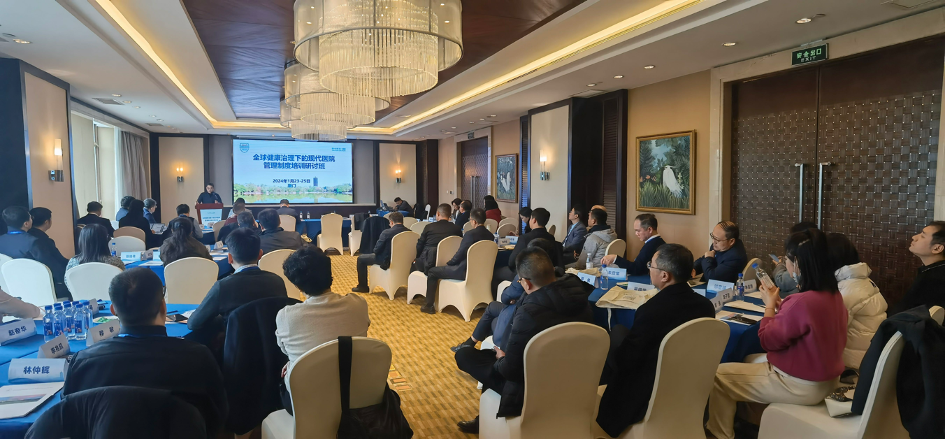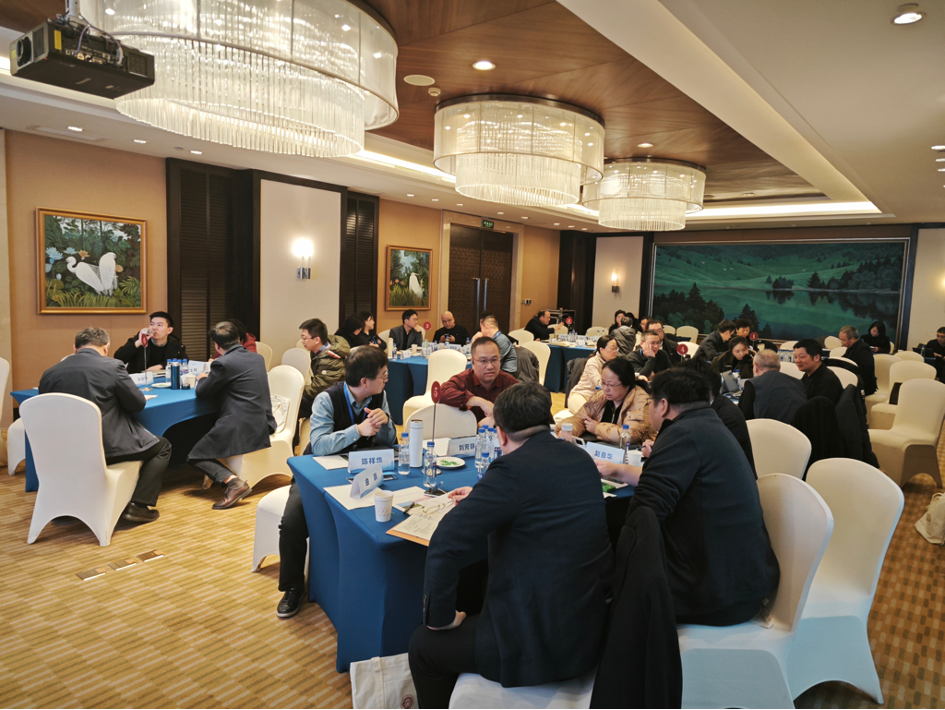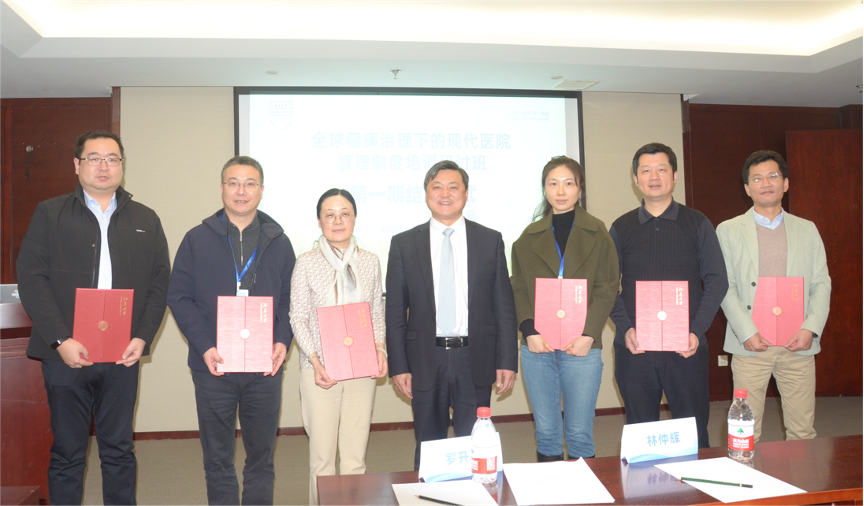The “Training Seminar on Modern Hospital Management Systems Under Global Health Governance” (Phase 1) was recently held in Xiamen from January 23rd to 25th 2024. The goal was to improve hospital management in accordance with the following documents:
1) "Guiding Opinions of the State Council Office on Establishing a Modern Hospital Management System" (State Council Document No. [2017] 67)
2) "Opinions of the State Council Office on Promoting the High-Quality Development of Public Hospitals" (State Council Document No. [2021] 18)
3) "Notice on Carrying Out Pilot Projects to Establish and Improve Modern Hospital Management Systems" (National Health and Health Commission Document No. [2018] 50)
The Department of Healthcare Reform of the National Health Commission and Institute for Global Health and Development at Peking University directed and organized, respectively, the seminar. It leveraged global perspectives and experts to assist hospital leaders in enhancing global health thinking and hospital governance capabilities. As a public welfare project under the National Health Commission, the training seminar was aimed at hospital officials. It focused on establishing and improving modern hospital management systems and promoting the development of high-quality hospitals. The curriculum combined industry, academia, and research with both micro and macro perspectives. The seminar used the Institute’s expertise in medicine, global health, health economics, and digital health.

The seminar primarily focused on the challenges of modern hospital management systems. Instructors presented diverse perspectives, empirical evidence, and relevant case studies to guide participation in discussions.
Ms. Haining Xue, Deputy Director of the Department of Healthcare Reform, introduced the background and objectives of the training seminar. She also put forth three requirements regarding consensus-building, focusing on the task, and implementing plans effectively.
Mr. Hongbiao Zhu, a senior official at the Department of Healthcare Reform, presented the first lecture with the theme of “Establishing a Sound Modern Hospital Management System.” The lecture introduced the design of hospital systems, covering design, principles, and other necessary requirements. Mr. Zhu also summarized progress in developing hospital systems from party, management, and governance perspectives.
Professor Shuqiang Xu at Shanghai Jiao Tong University and Director of the China Hospital Development Institute delivered a lecture titled “Public Hospital Reform and High-Quality Development.” The course discussed how public hospitals nationwide are reforming to improve efficiency and innovation. Professor Xu also addressed and analyzed problems in current development from multiple perspectives.
Professor Guoen Liu, Changjiang Distinguished Professor at Peking University, Dean of the Institute for Global Health and Development, and member of the Chinese Academy of Sciences gave a lecture titled “Economic Analysis of Major Trends in Medical and Health Care." Professor Liu discussed how the growth of the medical and health industry has exceeded economic growth, explaining five major trends in the industry. Against the backdrop of China's pursuit of high-quality development, China's labor force can better contribute to the further development of modern service industries such as medical services.
Professor Xu Ming, Associate Dean of the Institute for Global Health Development and Dean of the Global Health Department at Peking University, presented on "Global Health Policy and Governance Development." After introducing the rise of global health in the context of globalization, Professor Xu discussed important global health issues such as AIDS, tuberculosis, and malaria. He then outlined the basic pathways of global health governance and global health security threats and responses. Professor Xu also shared hospital management models from other countries such as the United States, Germany, Japan, the United Kingdom, and Singapore.
Qun Zhang, Director of the Medical Insurance Department at Beijing Hospital, lectured on "Medical Insurance Policy and Price Reform." Dr. Zhang explained the management approach of combining administrative management with autonomous management. He introduced the hospital's DRG (Diagnosis-Related Groups) group, explaining the transition from traditional target management models to DRG management. He also conducted an analysis of the current status of DRG operations and shared hopes on the transition from government-level management models to hospital-level management.
Yongzhong Cheng, Director of the Party and Government Affairs Office at Sichuan University gave a lecture on "Reflections on Hospital Operation Management and Reform in China." He elaborated on the requirements for high-quality development as outlined in the 19th National Congress report and emphasized how hospitals should adhere to promoting high-quality development as a theme. He shared his views on expanding domestic demand with supply-side structural reform.
Professor Tingfang Liu, Founding Director of the Hospital Management Department at Peking Union Medical College, and a Lifetime Fellow of IAQS (International Academy for Quality and Safety), delivered a lecture titled "Challenges and Countermeasures in Medical Safety." Professor Liu addressed the challenges facing medical safety, covering topics such as theoretical innovation in medical safety, the essence of medical safety, global medical safety alarms, strategic approaches to medical safety, the synthesis of three-dimensional tools, and international exchanges and cooperation. Professor Liu provided detailed explanations of the relationship between medical safety and quality and analyzed global medical safety alarms and challenges from both international and domestic perspectives.
Professor Man Jin, Director of the Laboratory for Arts and Health Management at Peking University, Double-Appointed Professor at the Institute for Global Health Development, Professor at the Opera Research Institute, and Dean of the School of Music at Shanxi University, gave a lecture on the topic of "Arts and Health Management." Professor Jin first explained the background in arts and health management. He then provided insights on the structure and content of this new interdisciplinary course, along with an analysis of prospects for the industry.
Guan Zhongjun, Secretary of the Party Committee at Xuanwu Hospital, delivered a lecture titled "Current Situation and Research of Modern Hospital Governance in China." He emphasized party building in establishing a sound modern hospital management system. The system of hospital directors under the leadership of the hospital party committee is a fundamental feature and advantage of China's modern hospital management system. The party committee plays a leading role in directing, managing, making decisions, promoting reforms, and ensuring implementation. It establishes and improves hospital leadership decision-making systems, basic management systems, and party building work systems.Top of Form
Jianbo Lei, Founder of the Center for Medical Informatics at Peking University presented "Current Status and High-Quality Development of Hospital Informatization." He discussed how medical informatics empowers hospital teaching, research, and development. Dr. Lei also emphasized the analysis and exploration of the challenges and solutions of hospital informatization, and concluded by sharing how informatization can support the implementation of new evaluation standards for tertiary hospitals.
Jingyi Feng Director and Researcher of the Medical Engineering Department at the First Affiliated Hospital of Zhejiang University School of Medicine, spoke on "Reflections and Practices on Innovation through Medical-Engineering Collaboration in Hospitals." She provided insights into the background of medical-engineering innovation through data, policy interpretation, and analysis. She then highlighted the current status of innovation through medical-engineering collaboration by analyzing case studies of the applications of artificial intelligence, 3D printing, robotics, wearable technology, and AR/VR technology in the medical field. Ms. Feng also shared relevant practical work on medical-engineering collaboration at the First Affiliated Hospital of Zhejiang University.

The seminar also held a closing ceremony, where groups made speeches and discussed relevant issues. Under the National Health Commission, similar training seminars will be conducted in the first half of this year, targeting management groups from pilot hospitals in central and western regions of the country.

(Interpreted by Waverly Shi)